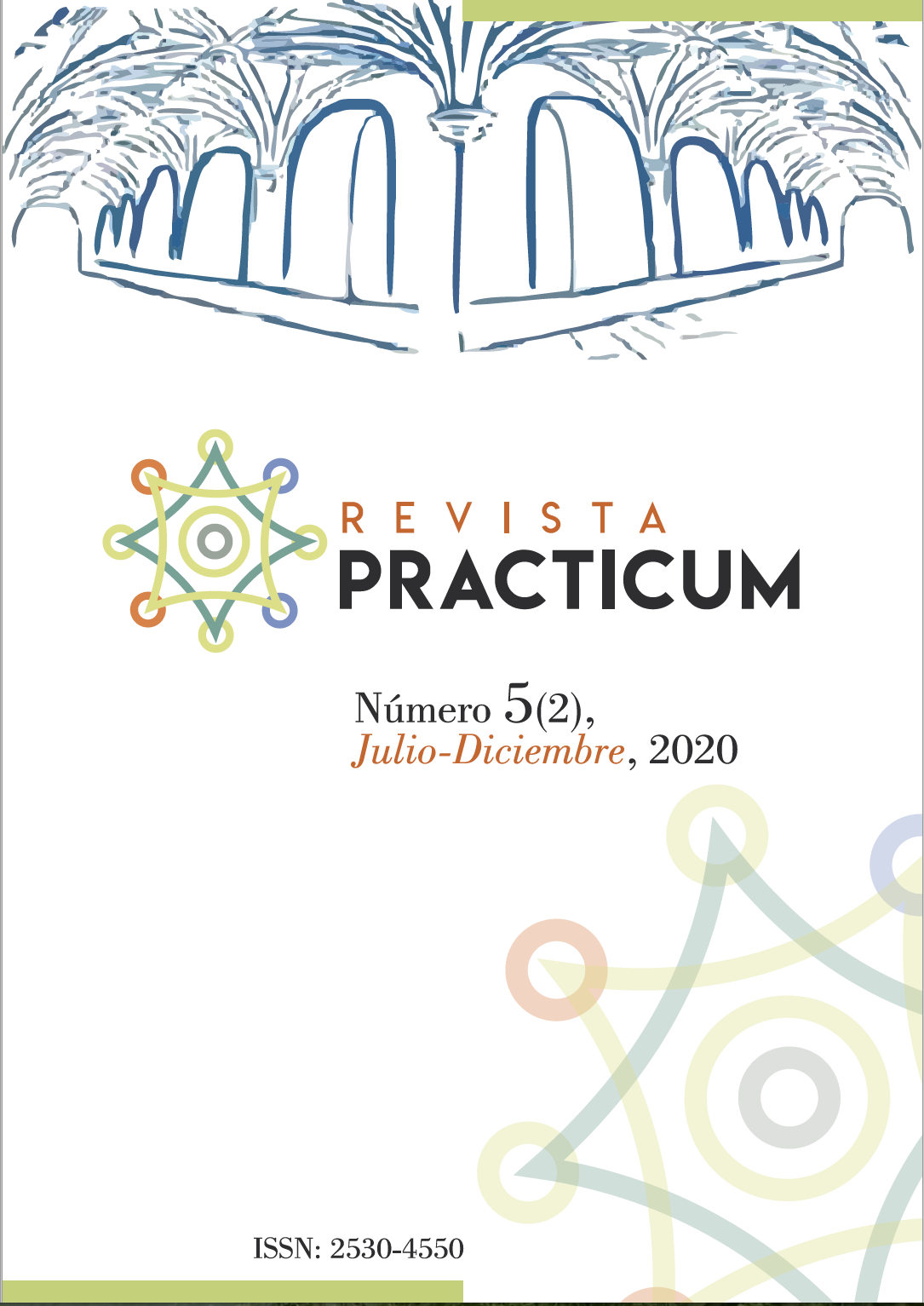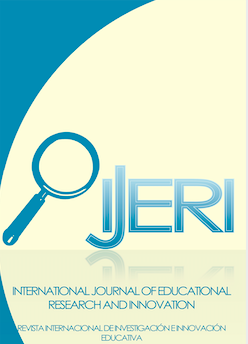Methodological training for bilingual teaching. Indicators in Practicum Reports
DOI:
https://doi.org/10.24310/RevPracticumrep.v5i2.10545Keywords:
Practicum; bilingual education, trainee teacher, primary document, methodo-logical integrationAbstract
This qualitative research has been developed for a diagnosis of the integration of diverse methodological components, required for the implementation of bilingual teaching programmes in Primary Education. Practicum Reports are chosen since they constitute a productive research site in pre-service teacher training from its academic layout. A non-probabilistic documentary sample of 108 Practicum Reports is selected from a significant institutional context. They all correspond to the Mention of English as a Foreign Language. The technique of content analysis is applied, which makes available the experiential collective of methodological decision-making that covers two of its elements: the teaching proposal and the bottom line. The results reveal contradictions, paradoxes and difficulties driving the tendency to focus the integration on two methodological perspectives: learning strategies and collaborative learning. Indicators are set out as conclusions in terms of training productive lines to ensure an optimal complementarity and combination of the methodological components.
Downloads
Metrics
References
Ball, P., Kelly, K., & Clegg, J. (2015). Putting CLIL into practice. Oxford: Oxford University Press.
Bardin, L. (2002). Análisis de Contenido. Madrid: Akal.
Barranco Izquierdo, N., Sanz Trigueros, F. J., Calderón Quindós, M. T., & Alario Trigueros, A. I. (2016). SciencePro Project: towards excellence in bilingual teaching. Estudios sobre Educación, 31, 159-175. https://doi.org/10.15581/004.31.159-175
Beacco, J. C., Byram, M., Cavalli, M., Coste, D., Egli Cuenat, M., Goullier, F., & Panthier, J. (2016). Guide for the development and implementation of curricula for plurilingual and intercultural education. Strasbourg: Council of Europe. Recuperado de https://bit.ly/2VxxM3J
Berg, B. L. (2012). Qualitative Research Methods for the Social Sciences. Boston: Allyn & Bacon.
Bertaux, P., Coonan, C. M., Frigols-Martín, M. J., & Mehisto, P. (2010). The CLIL Teacher’s Competences Grid. Common Constitution and Language Learning (CCLL) Comenius-Network. Recuperado de https://bit.ly/2VB7pdb
Blanco Encomienda, F. J., & Latorre Medina, M. J. (2008). La apuesta por la excelencia en la formación práctica universitaria de futuros profesores. Estudios sobre Educación, 15, 7-29. https://doi.org/10.15581/004.15.%25p
Bleichenbacher, L. (coord.) (2019). Teacher Competences for Languages in Education. Conlusions of the Project. Graz: ECLM-Council of Europe. Recuperado de https://bit.ly/2Skv0gn
Coste, D., Cavalli, M., Cri?an, A., & van de Ven, P. H. (2009). Plurilingual and intercultural education as a right. Strasbourg: Council of Europe. Recuperado de https://bit.ly/2W8OdTl
Council of Europe (2018). Common European Framework of Reference for Languages: Learning, Teaching, Assessment. Companion volume with new descriptors. Strasbourg: Language Policy Programme. Education Policy Division. Recuperado de https://bit.ly/2VSaogl
D’Angelo, L., & Pascual, E. (2012). The personal and professional profile of the CLIL subject teacher. En D. Marsh y O. Meyer (Eds.), Quality Interfaces: Examining Evidence & Exploring Solutions in CLIL (pp. 66-78). Eichstatt: University of Eichstatt Press.
Domingo, A., & Gómez M.V. (2014). La práctica reflexiva. Bases, modelos e instrumentos. Madrid: Narcea. Recuperado de https://bit.ly/3cHKVNk
Duverger, J. (Coord.) (2011). Enseignement bilingue. Le professeur de «Discipline Non Linguistique»: statut, fonctions, pratiques pédagogiques. Paris: ADEB.
Escobar, C. (2013). Learning to become a CLIL teacher: teaching, reflection and professional development. International Journal of Bilingual Education and Bilingualism, 16, 335-353. http://dx.doi.org/10.1080/13670050.2013.777389
European Commission (2019). Key competences for lifelong learning. Luxembourg: Publications Office of the European Union. http://dx.doi.org/10.2766/569540
Golombek, D. A. (2008). Aprender a enseñar ciencias. Del laboratorio al aula y viceversa. Buenos Aires: Santillana. Recuperado de https://bit.ly/352GNEZ
González Sanmamed, M., & Fuentes Abeledo, E. J. (2011). El practicum en el aprendizaje de la profesión docente. Revista de Educación, 354, 47-70. Recuperado de https://bit.ly/3bAUs8B
Guillén Díaz, C. (2014). Profesionalización y desarrollo profesional docente en el ámbito de la Didáctica de las Lenguas-Culturas. Referencias al profesor José Manuel Vez. En D. Madrid Fernández, C. Guillén Díaz y A. López Valero (Eds.), Estudios en didáctica de la lengua y la literatura en homenaje al profesor José Manuel Vez Jeremías (pp. 31-45). Granada: Universidad de Granada.
Gutiérrez Sáenz, R. (2006). Introducción al Método científico. Méjico: Esfinge.
Hernández Sampieri, R., Fernández Collado, C. y Baptista Lucio, P. (2010). Metodología de la Investigación. Perú: McGraw Hill.
Lasagabaster, D., & Ruiz de Zarobe, Y. (Eds.) (2010). CLIL in Spain. Implementation, Results and Teacher Training. Newcastle: Cambridge Scholars. Recuperado de https://bit.ly/2KsdySy
Latorre Medina, M. J. (2007). El potencial formativo del prácticum: cambio en las creencias que sobre la enseñanza práctica poseen los futuros maestros. Revista de Educación, 343, 249-273. Recuperado de https://bit.ly/2KsDtK1
Long, M. (2015). Second Language Acquisition and Task-Based Language Teaching. Malden, MA: Wiley-Blackwell. Recuperado de https://bit.ly/2S4snPE
Marsh, D. (2012). Content and Language Integrated Learning (CLIL). A Development Trajectory (Tesis doctoral). Córdoba: Servicio de Publicaciones Universidad de Córdoba. Recuperado de https://bit.ly/2x5NWrz
Marsh, D., Mehisto, P., Wolf, D., & Frigols Martin, M. J. (2011). European Framework for CLIL Teacher Education. A Framework for the Professional Development of CLIL Teachers. Graz: European Centre for Modern Languages. Council of Europe. Recuperado de https://bit.ly/2VxCmPt
Ministerio de Educación y Formación Profesional (2018). Datos y cifras. Curso escolar 2018/2019. Madrid: Secretaría General Técnica. Recuperado de https://bit.ly/3cHO3J4
Ministerio de Educación y Formación Profesional (2019). Sistema estatal de indicadores de la Educación 2019. Madrid: Secretaría General Técnica. Recuperado de https://bit.ly/2VSvTh6
Nunan, D. (1991). Language teaching methodology. New York: Prentice Hall.
Oxford, R. (2003). Language learning styles and strategies: Concepts and relationships. Iral, 41(4), 271-278. http://dx.doi.org/10.1515/iral.2003.012
Pastor Martínez, M. R. (2011). CLIL and cooperative learning. Encuentro, 20, 109-118. Recuperado de https://bit.ly/3546vZR
Pavón Vázquez, V., & Ellison, M. (2013). Examining teacher roles and competences in Content and Language Integrated Learning (CLIL). Linguarum Arena, 4, 65-78. Recuperado de https://bit.ly/2x4bq0b
Perrenoud, P. (2001). Développer la pratique réflexive dans le métier d'enseignant. Professionnalisation et raison pédagogique. Paris: ESF.
Puren, C. (1994/2013), La didactique des langues étrangères à la croisée des méthodes. Essai sur l’éclectisme. Paris: Didier. Recuperado de https://bit.ly/3eNQLP7
Sanz Trigueros, F. J. (2018). Desarrollo profesional y adaptabilidad del docente de y en lenguas extranjeras en las dinámicas europeas. Un estudio para sus cualificaciones en la enseñanza obligatoria (Tesis doctoral). Universidad de Valladolid, España.
Tomlin, R. (1990). Functionalism in Second Language Acquisition. Studies in Second Language Acquisition, 12(2), 155-178.
Van den Branden, K. (2016). Task-based language teaching. The Routledge Handbook of English Language Teaching. En G. Hall (Ed.), The routledge handbook of English language teaching (pp. 238-251). New York: Routledge.
Yin, R. K. (2016). Qualitative research from start to finish. London: The Guilford Press. Recuperado de https://bit.ly/2x8GWKE
Zabalza Beraza, M. A. (2011a). Practicum in higher education: state of the art. Revista de Educación, 354, 21-43. Recuperado de https://bit.ly/3ePh9YY
Zabalza Beraza, M. A. (2011b). El practicum como socialización profesional. Organización y gestión educativa. Revista del Fórum Europeo de Administradores de la Educación, 19(6), 11-13.
Zabalza Beraza, M. A. (2013). El Practicum y las Prácticas en Empresas en la formación universitaria. Madrid: Narcea. Recuperado de https://bit.ly/2S0xbFu
Downloads
Published
How to Cite
Issue
Section
License
Acceptance of the work implies that the author grants Revista Prácticum the exclusive rights to reproduce, distribute and sell his or her work worldwide, both in digital and paper formats, CD-ROM, etc.
Likewise, the authors shall grant Revista Prácticum the rights of dissemination, public communication on the Internet and IT networks, data buses, as well as any other portals or electronic devices for online consultation of its contents and extracts, under the conditions of the portal, repositories or databases where the work is stored.
Revista Prácticum allows authors to publish and disseminate their articles and works on their personal websites, research teams, institutional repositories and scientific databases. All this in accordance with the Creative Commons 4.0 License









8.png)








